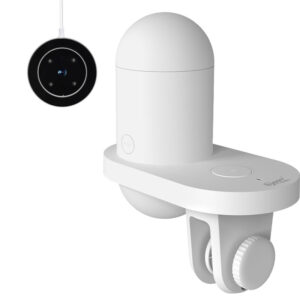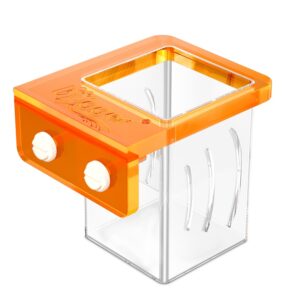Those who have a passion for aquariums find themselves embarking on a mesmerizing aquatic journey. But things get difficult when it comes to seeing the well-being of their underwater charges. Picture this: brilliantly hued fish fading, falling victim to ailments against all odds. The culprit? Often overlooked yet pivotal—aquarium fish nutrition.
Content Table
This aquatic world contains a silent assailant, a deficiency of vitamin C, which erodes the immunity of fish and suppresses their vitality. But fear not! Understanding fish nutrition and the role of vitamin C in aquariums is the light guiding us to the aquatic Garden of Eden.
Why Aquarium Fish Need Vitamin C
Vitamin C is a leading natural immune booster. It stimulates the immune system, activating immune cells and building the body up against invasions of bacteria and viruses. Microbial entry via fish skin, gills, and gastrointestinal tract is blocked by a collagen barrier. Vitamin C accumulates in white blood cells at a high concentration, protecting against oxidative damage during battles against infections.
Collagen Synthesis and Tissue Health
Collagen plays a central role in vitamin C’s strength. This connective tissue not only keeps the structure of muscles, bones, and tissues intact but also plays a major part in wound healing, with a result that the wound can heal quickly; All parts of the system are strengthened.
Immunity Boost and Antioxidant Shield
Front-line defender vitamin C reinforces aquatic creatures ‘immune systems. Working together with vitamin E, it destroys harmful free radicals, preventing oxidative damage. Not only does this mighty antioxidant capability help strengthen the body’s defenses, it also actually reduces the harmful impact of toxic chemicals in water, and stabilizes fish health during temperature fluctuations.
Stress Resilience and Health Enhancement
The unstable environment inside aquariums puts aquatic life under stress from handling, transportation, and abrupt changes. So vitamin C becomes a wall against these stress-related difficulties and adjusts its concentration in fish tissues to tense times. Also, it assists excretion of toxins, keeping at bay the noxious effects of nitrite and treating ammonia poisoning, striving for steadiness and stability.

Reproduction and Larval Development
The importance of vitamin C even extends to the reproductive cycles of fish and shrimp. It promotes full-bodied brooders, enhances the quality of eggs and sperm, and increases overall reproductive vitality. In addition, in the early larval stages, a diet rich in vitamin C promotes more rapid development, which leads to a reduction in the mortality rate and a large increase in robustness.
Immune Fortification and Disease Prevention
As a natural immune booster, vitamin C is at the top of the ranks. It stimulates the immune system. It activates immune cells and makes the body resistant to attacks by bacteria and viruses. The collagen barrier blocks the entry of microorganisms through the skin, gills, and gastrointestinal tracts, while high concentrations of vitamin C in white blood cells mean added protection from Godzilla-like oxidative damage in these same battles against infections.
The Nutritional Needs of Freshwater and Saltwater Fish
Understanding these differences is essential to providing a custom-tailored diet based on the needs of individual freshwater and saltwater fish so that they can be at their healthiest and most energetic within your aquarium.
Freshwater Fish
| Proteins | Essential for growth and tissue repair | Carbohydrates | Energy sources vital for daily activities |
| Fats | Provide energy and aid in nutrient absorption | Vitamins | Includes vitamin C, vital for immune support and overall health |
| Minerals | Calcium, phosphorus, and others crucial for bone development | ||
Saltwater Fish
| Diverse Diet | Often requires live food, frozen varieties, and nutrient-enriched pellets | Proteins | Essential for muscle development and growth |
| Fatty Acids | Omega-3 and Omega-6 for health and color enhancement | Vitamins | A varied range similar to freshwater counterparts |
| Trace Elements | Iodine, magnesium, and others for metabolic functions and osmoregulation | ||
Food Increases Aquarium Fish Nutrition
In feeding aquarium fish, many people think that canned fish food alone is enough. But in fact, other foods exist that can increase the nutrition of your fish greatly. There are many choices, ranging from common foods found in your kitchen to special meals.
Canned Fish Feed
Feeding aquarium fish is convenient and easy with this option. These feeds are designed to provide a balanced diet for fish and are generally a combination of proteins, vitamins, and minerals. But you need to get feeds from a good brand and of excellent quality so your fish will get the nutrition they need.
Fry
Several species of aquarium fish have fry, or young fish, that require a special diet to support their development. Some essential nutrients can be found in live or frozen brine shrimp, microworms, or powdered fry food.
Vegetables and Fruits
You can vary your fish’s diet and add some nutrients by adding some vegetables and fruits. For herbivorous or omnivorous fish, go for blanched peas, spinach, zucchini, or cucumber slices. Secondly, little pieces of fruit such as oranges or apples may also be given as treats.
Specially Prepared Meals
Others choose to make their homemade fish food with fresh ingredients. It also means your fish are getting the purest, most nutritious foods. Homemade meals can be made of proteins like fish or shrimp, as well as vegetables and fruits.
Note: When adding new foods to your fish’s diet, be certain to introduce them gradually to avoid digestive problems. Also monitor your fish’s behavior, appearance, and state of health to make sure they are eating enough.

How Many Feeding Per Day is Enough for Most Aquarium Fish
Feeding aquarium fish is important, but it must be balanced. Though overfeeding can create poor water quality and cause health problems for the fish, underfeeding can lead to malnutrition and stunted growth. Feeding frequency depends on the type of fish, size, and diet. Here are some general guidelines for popular aquarium fish. You can feed them on schedule via an intelligent fish feed when you’re busy.
Betta Fish
Betta fish are normally fed once or twice daily. Their stomachs are small, and they tend to overeat, so feed them frequently and in small portions.
Goldfish
Compared with other fish, goldfish should only be fed 1–2 times a day. They have a slower digestive system and easily become constipated if overfed.
Neon Tetras
Neon tetras are little schooling fish that must be fed 2–3 times daily. Their mouths are small, and they prefer flakes or micro pellets.
Guppies
Because guppies are hardy fish, they can be fed 2–3 times a day. They are omnivorous and can be easily fed flakes, pellets, or live or frozen foods.

Angelfish
Angelfish are best fed 2 or 3 times each day. They are omnivorous and must be fed a mixture of flake or pellet food and live or frozen foods such as brine shrimp or blood worms.
Corydoras Catfish
Feed them once or twice a day. These bottom-dwelling fish. As omnivores, they eat sinking pellets and tablets in addition to frozen and live foods.
Discus Fish
They are finicky eaters and should be fed in small portions 3–4 times a day. They need a high-protein diet and may eat bloodworms, beef heart, or others.
Oscars
Large carnivorous fish, oscars should be fed once or twice a day. They need a high-protein diet and can be fed a combination of pellets, flakes, and live or frozen foods.
Summary
Nutrition is a key factor in building a healthy aquatic life in the wonderful world of aquariums. The all-important nutrient, vitamin C, which plays a role in fortifying fish immunity, promoting tissue health, and increasing stress resistance is just one of the many that we can study in detail.
Proteins, carbohydrates, fats, vitamins, and trace elements all must be tailored to suit the unique needs of both freshwater and saltwater fish. Varied feeding options, from special feeds to home meals, bring sparkle to the nutrition universe; while the feeding cycle is set according to the type of fish in question to prevent lethargy and illness. Knowing is half the battle when we understand these nuances, we have a lively, healthy aquatic environment.


Leave a comment